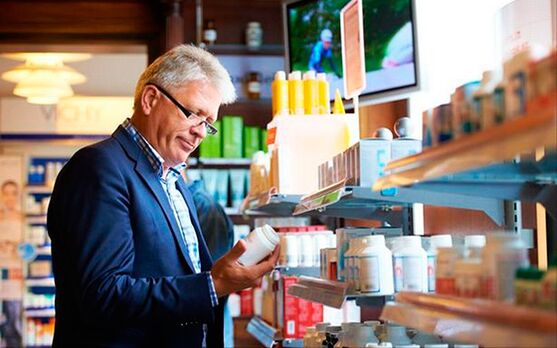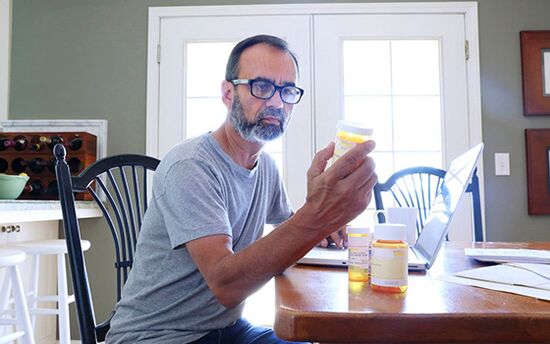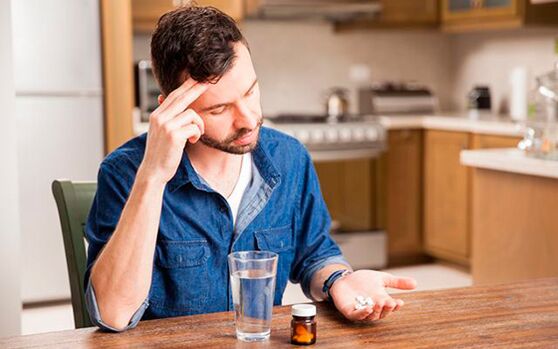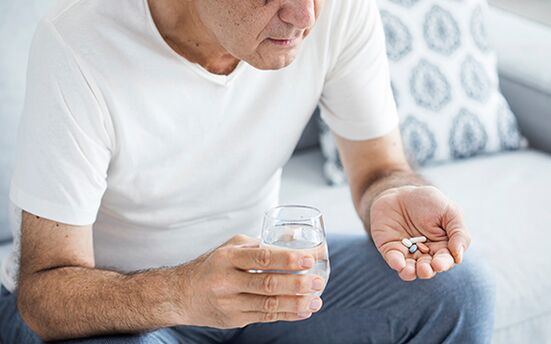The treatment of advanced prostatitis - both chronic and acute - is a complete event that requires parallel use of a series of different medicines.Each specific case individually constitutes the necessary list of drugs, depending on the history of the patient, the course of the disease and a series of other important factors.

Types of drugs
The selection of economic but effective drugs for prostatitis is based on the understanding of the causes of the disease and the characteristics of its event, however, antibiotics and anti -inflammatory drugs should be considered the key aspects of any list of medicines.In addition, if the latter can be of a general nature, then it is advisable to prescribe antibiotic therapy, taking into account the opposition of a specific type of pathogen identified following analysis.
In addition, these drugs against prostatitis such as various types of anti-pier, painkillers, diuretics, alpha-blockers, antispasmodic, antiandrogen and laxatives can be used in therapy.
You can classify modern drugs not only for its planned purpose, but also in the form of release:
- Injections (injections): The treatment of inflammation of the prostate gland with injections is justified, first of all, in the case of a serious condition of a patient who requires immediate stabilization.As a rule, the drugs concentrated in the ampoules are diluted until the solution is obtained, after which is prescribed by intramuscular or intravenous infusion;
- Candles: Medicines in the form of candles are relevant during planned chronic prostatitis therapy or as drug prevention drugs.In some cases, suppositories are prescribed to increase the power, since the absorption of the substance of the intestinal mucosa provides its best penetration into the fabric of the prostate;
- Tablets and capsules: these drugs are the most common in the standard treatment scheme for chronic or acute prostatitis.The tablets are easy to dose and take comfortably, therefore most antibiotics, anti-inflammatory and remedies against edema (alpha-blockers or 5-Alfa inhibitors Reduttasi) are produced in this form;
- Insstillations: this is not so often practiced with prostatitis, whose essence is the introduction of a medicinal solution in the urethra or bladder using a special syringe.The main objective of the stillation is the restoration of the damaged mucosa, the destruction of the pathogenic microflora and the suppression of inflammatory processes;
- Microclisms: small cold enemas reduce local edema, inflammation and pain in the prostate gland, although at the same time they worsen the transport of drugs in its tissue.In the final stages of therapy and after recovery, microcrism courses with solutions based on vegetable drugs could be conducted.With a fairly long retention of the fluid in the intestine, its mucosa absorbs charity substances;
- Crepasti: expensive patches, such as Microclyster, belong to auxiliary measures in the treatment of a prostate and have a support effect on the body, completing full drug therapy.

When choosing the dosage form of the drug, it is also necessary to consider, in addition to the patient's condition, your preferences.Some patients have problems with swallowing tablets, while others are contraindicated to others due to the presence of inflammatory diseases in the anorectal region.A significant role is also played by factors such as the availability and cost of drugs-do not always be able to choose a high-speed and economic cure for prostatitis, which is why it is necessary to take less effective analogues.
Antibiotics
The selection of antibiotics requires a selective approach, since it is important to choose a medicine that suppresses a specific type (or species) of pathogens of inflammatory prostatitis.Because the doctors study the blows taken from the urethra, urine tests and prostate secretion samples.
It is extremely desirable to use antibacterial antibiotics that have bacteriostatic and bactericidal effects so that the drug not only blocks the spread of the infection, but actively destroys dangerous microorganisms.
Beta-lactemic antibiotics, such as aminoglycosides, are preferred to a lesser extent, although they are cheap.Unlike fluorochinolons and macrolides, they are characterized by a weak ability to penetrate the fabrics of the prostate gland and create the necessary concentrations of the active substance in it.Forchinoloni are powerful bactericidal preparations that are significantly superior in this parameter, stopping the propagation of microorganisms, drugs
Alpha-Bloccanti
This group of funds is actively used not only for prostatitis, but also for prostate adenoma, and their effectiveness is based on the blocking of alpha-adrenergic receptors in order to prevent their contact with norepinephrine and adrenromimetics.Consequently, the receptors in the pots do not receive vasoconstrictive nerve signals, due to which their expansion is obtained with the subsequent improvement of blood circulation.
It should be noted that selective Alfa1 blockers are actively used in urology, influencing receptors in the fabrics of the bladder, prostate and urinary tract.
A decrease in the swelling of the tissues not only improves the removal of toxins and liquid waste, but also tones the entire genital system of men, helping to get rid of impotence and the reduction of an erection.
Anti -inflammatory drugs

Prostatitis in men is treated with the use of non -steering anti -inflammatory drugs (NSAID/NSAIDs) that meet the efficiency requirements, but at the same time safe for the body.The task of these drugs is to suppress the inflammatory process, which influenced the prostate and, possibly, the seed bubbles, the bladder neck and the distal urinary tract.
Following a decrease in the clinical gravity of the inflammation of the prostate, the patient's condition is noted, including a decrease in body temperature, a decrease in swelling of the prostate gland, eliminating the urgelic obstruction and the suppression of pain in the genital region.
Hormonal drugs
The use of hormonal drugs in the treatment of prostatitis is allowed only in the case of a chronic neglected of the disease of the disease, in which antibiotics, alpha blockers and anti -inflammatory drugs are unable to normalize the disturbed hormonal background.
Depending on the objectives, both the androgens can be prescribed to the patient who increase the level of male hormones (testosterone) in the blood and estrogen that suppress the production of dihydrotestosterone, which causes the growth of prostate tissues.
All these drugs are released strictly based on the prescription and should be used exclusively by the prescription of the attending physician, since the incorrect or premature dosage can destroy the patient's health.
Immunomodulators
The complicated course of acute prostatitis is aggravated by the development of immunosuppression, which can increase under the influence of a series of antibiotics and other drugs.For this reason, it is necessary to strengthen the body's resistance (resistance) in relation to the pathogenic microflora, which is carried out using immunostimulating.
Do not forget that vitamins A, C E and and contribute to the strengthening of immunity, therefore experts recommend that they actively consume products containing these substances in large quantities.
Analgesics
The anesthetic drugs, as a rule, are necessary in the early stages of therapy, when the treatment has not yet managed to functionally improve the conditions of the prostate, which is why the patient experiences pain during urination, defecation, the long session on a hard surface or physical activity.
As a rule, there are enough medium force analgesics accepted on the basis of the requirements three times a day.The funds listed have many structural (generic) analogues and are produced by many Russian and foreign companies, but doctors recommend preference to domestic analgesics so as not to pay in excess for the brand.
Musorelassant
From the class of muscle relaxants in Urology, it is customary to prescribe antispasmodic - drugs that help to relax the muscles smooth in a spasm state.This therapy is effective in the acute course of prostatitis, causing an involuntary spasm of the prostate muscles and the entire pelvic floor.

The use of the antispasmodic course is not necessary: simply bring them to moderate doses during the first days or week of general therapy.Furthermore, these drugs cannot be abused to avoid the risk of compromised functionality of the body and relevant systems of the body.
Vegetables
Plant drugs prescribed for prostatitis are often food supplements produced in the form of rectal suppositories, capsules or tablets.Among the popular extracts that make up the basis of these drugs: the cortex of African plum, the fruits of the cleared palm trees (or dwarfs).A little less often used an extract from the prostate gland of animals (cattle).There is also a group of drugs such as homeopathic preparations for the treatment of prostate inflammation.
For prostatitis prevention
Prostatitis prevention requires, first of all, to conduct a healthy lifestyle, including regular sexual activity.But to maintain the tone, various drugs can be used - normally, we are talking about biologically active additives of vegetable origin.Since the producers of these food supplements are declared their ability to help weaken libido, impotence, erectile dysfunction and other disorders in the work of the male parental system, they should be careful with caution as prostititis preventive agents.





































